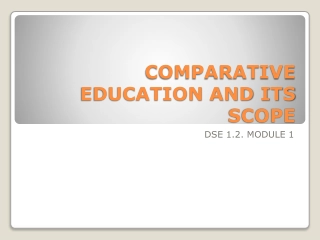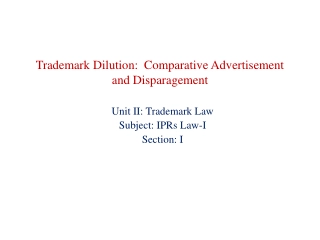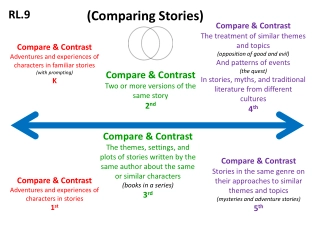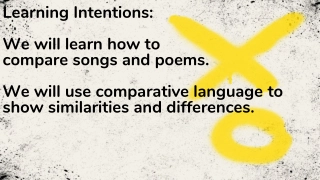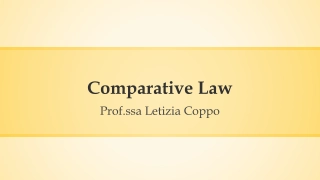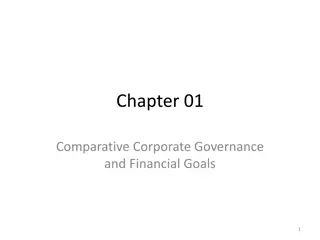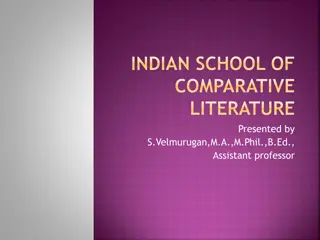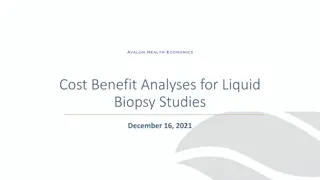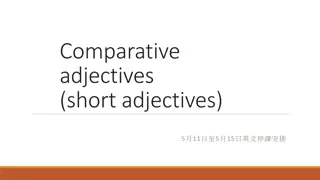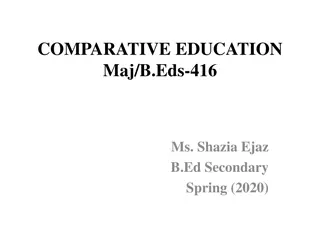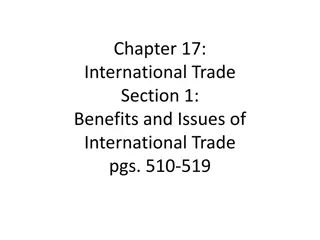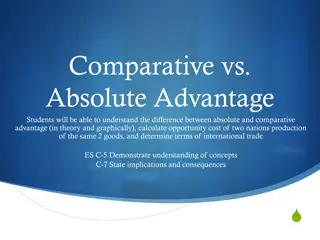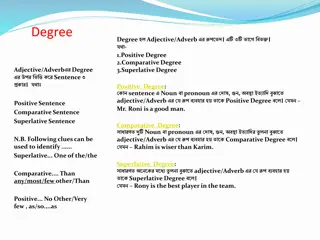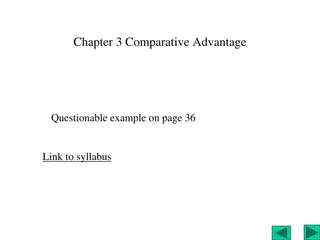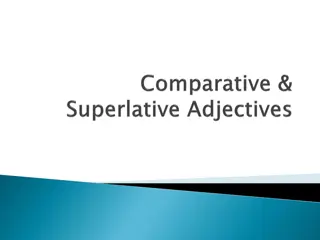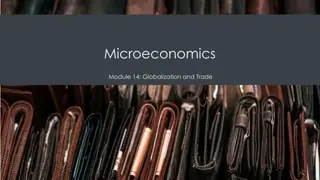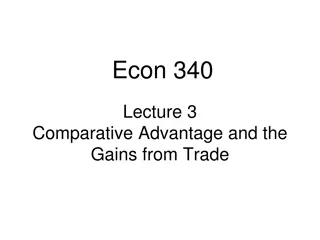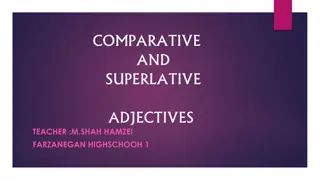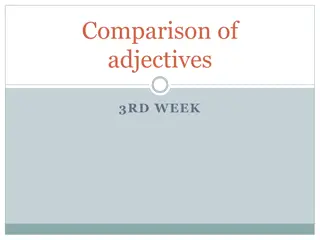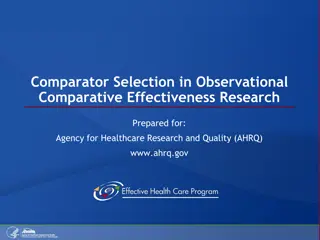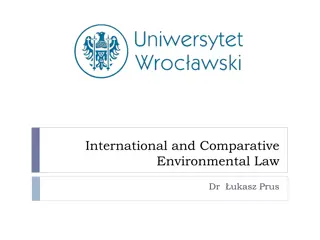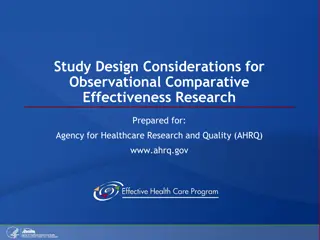Comparative Education and its Scope
The discipline of Comparative Education, its scope, and its impact on educational systems worldwide. Analyze different perspectives, geographical units, ideologies, themes, and historical development.
10 views • 6 slides
Trademark Dilution and Comparative Advertisement
Trademark dilution and comparative advertisement in trademark law. Understand the grounds for trademark infringement and the elements needed to establish dilution or disparagement. Explore the importance of protecting registered trademarks and the limitations of comparative advertisement.
0 views • 6 slides
Comparative Analysis of Positive Charge's Charging Stations Evolution
This PowerPoint template example created by Romy Bailey for Positive Charge showcases a comparative study of high-speed charging stations versus traditional charging stations, along with a comparison of past year versus current year data, and a year-over-year analysis of Positive Charge's growth. It
1 views • 6 slides
Comparative Analysis of Stories Across Cultures
Explore the comparative analysis of stories by comparing themes, settings, and characters across different cultures and authors. Dive into various adventures and experiences of characters in familiar and traditional stories. Understand the treatment of similar themes and topics like good versus evil
2 views • 8 slides
Learning Intentions: We will learn how to compare songs and poems. We will use comparative language to show similarities and differences.
Explore the art of comparing songs and poems, using comparative language to highlight similarities and differences. Dive into Venn diagrams, linking words, and key terms to analyze genres like Reggae, Irish Ballads, and Rap music.
1 views • 10 slides
The Evolution of Comparative Law in Globalized Society
Comparative law delves into the diverse legal systems worldwide, aiming to identify convergences and divergences, promoting harmonization and understanding in an increasingly globalized world shaped by technological and digital advancements.
1 views • 38 slides
Comparative Sociology
Comparative Sociology is a specialized branch that compares societies to provide generalizations, focusing on the structure and jurisdiction of groups and organizations. It involves studying affinities and disparities to predict outcomes. The discipline is closely related to Social Anthropology. Com
3 views • 15 slides
A Comparative Analysis Across Transport Modes
In the dynamic landscape of global trade and logistics, the efficient movement of goods is paramount. Central to this process is cargo pricing, a critical determinant that significantly impacts supply chain decisions and costs. As businesses strive to optimize their logistics operations, understandi
4 views • 5 slides
Comparative Corporate Governance and Financial Goals in Multinational Business
Understanding the dynamics of Comparative Corporate Governance and Financial Goals in Multinational Enterprises (MNEs), exploring the significance of Shareholder Wealth Maximization, Stakeholder Capitalism, and the impact of cultural, governance, and financial differences on global financial managem
0 views • 20 slides
Comparative Analysis of Behavioral Health Services in Florida
This comparative analysis presents available behavioral health services across various Florida state agencies, third-party insurers, and health plans. The services cover assessment, treatment planning, therapy, psychosocial rehabilitation, supportive housing, mental health clubhouse services, case m
0 views • 6 slides
Transformation of Degree: A Lesson in English Grammar
In the lesson about Changing of Degree, students will learn how to transform superlative, comparative, and positive degrees in English grammar. The teacher will cover rules and examples for converting superlative degree to positive degree, comparative degree to positive degree, and more. The learnin
1 views • 22 slides
Exploring Fairy Tales Through Comparative Literature for Enhanced Learning
Delve into the world of fairy tales through comparative literature to bridge the gap between school and social/cultural aspects, enhancing analytical skills and moral values. Using different models and pre-reading activities, engage learners in exploring the rich themes and characters in fairy tales
1 views • 14 slides
Insights into the Indian School of Comparative Literature: A Comprehensive Overview
The Indian School of Comparative Literature, pioneered by Dr. Buddhadeva Bose in 1956 at Jadavpur University, plays a crucial role in studying the diverse languages and rich literary traditions of India. This academic discipline has grown significantly, with a focus on French symbolist poetry's infl
2 views • 14 slides
Cost-Benefit Analyses for Liquid Biopsy Studies: Understanding Health Economics and Decision Making
Health economics and decision making play a crucial role in evaluating the clinical utility and cost-effectiveness of liquid biopsies. Economic models such as cost-effectiveness analyses help in determining the incremental cost-effectiveness ratio (ICER) of interventions. Studies have shown varying
0 views • 23 slides
Comparative Health Effectiveness Study: Quality of Life Outcomes with Medical and Invasive Approaches
This primary report funded by the National Heart, Lung, and Blood Institute presents the International Study of Comparative Health Effectiveness with Medical and Invasive Approaches. The research evaluates whether an invasive strategy improves health status in stable patients with moderate ischemia,
1 views • 21 slides
Comparative Adjectives: Short Adjectives and Usage
Comparative adjectives are used to compare two things, such as the length, size, or appearance. They can be formed by adding -er to short adjectives like big, long, thin, short, and pretty. When the adjectives end in -y, change the -y to -i and add -er. Use "than" to compare two things in the same s
5 views • 10 slides
Understanding Comparative Education: Scope and Aims
Comparative education involves studying educational theories and practices across different countries to analyze the relationship between education and society. It aims to explain educational systems, aid in the development of institutions, and form generalized statements applicable in various natio
0 views • 31 slides
Understanding Monetary Policy Effectiveness in the IS-LM Framework
The relative effectiveness of monetary policy in influencing investment, employment, output, and income depends on the shape of the LM curve and the IS curve. A steeper LM curve signifies higher effectiveness as it indicates less interest elastic demand for money, resulting in significant changes in
0 views • 24 slides
Comparative Effectiveness Study of Second-Line Agents in Status Epilepticus Treatment: ESETT Trial
Comparative effectiveness study known as ESETT Trial aims to determine the most effective second-line agent for treating benzodiazepine-refractory status epilepticus in emergency departments. Fosphenytoin, valproic acid, and levetiracetam are common choices, but the best option remains uncertain. Th
0 views • 48 slides
Comparative Effectiveness Study of Fosphenytoin, Valproic Acid, and Levetiracetam in Status Epilepticus Treatment
The ESETT study is a comparative effectiveness trial evaluating fosphenytoin, valproic acid, and levetiracetam in treating benzodiazepine-refractory status epilepticus. The goal is to determine the most effective among these agents while assessing safety outcomes. Inclusion criteria focus on patient
0 views • 48 slides
Understanding International Trade: Benefits, Specialization, and Comparative Advantage
International trade involves benefits and issues, with specialization playing a key role in driving economic patterns through resource distribution. David Ricardo's theory of comparative advantage revolutionized trade by focusing on producing goods efficiently. Absolute advantage and comparative adv
0 views • 12 slides
The Importance of International Trade: Benefits and Comparative Advantage
Nations engage in trade to exchange goods and services across borders, benefiting from comparative advantage to produce efficiently. Comparative advantage theory highlights the efficiency gains when each nation focuses on what it does best. Importing and exporting goods and services allow countries
0 views • 10 slides
Understanding Comparative and Absolute Advantage in International Trade
Understand the concepts of absolute and comparative advantage through theory, graphical illustrations, and opportunity cost calculations for two nations. Explore the implications and consequences of these concepts in terms of international trade. Specialization, division of tasks, and gains from tra
0 views • 15 slides
Examples of Superlative and Comparative Forms
The content includes examples of superlative and comparative forms, along with positive constructions. Images are used to illustrate each example, making it easy to understand the concepts. Different scenarios are presented to demonstrate the usage of superlative and comparative adjectives in senten
0 views • 42 slides
Understanding Degrees of Adjectives and Adverbs
This content explains the concept of positive, comparative, and superlative degrees of adjectives and adverbs in English grammar. It provides rules and examples for transforming positive into superlative, positive into comparative, comparative into positive, comparative into superlative, and more.
0 views • 8 slides
Understanding Comparative Advantage in Economics: Adam Smith and David Ricardo
Explore the concepts of absolute advantage versus comparative advantage as discussed by renowned economists Adam Smith and David Ricardo. Discover how free market principles, self-interest, and efficient resource allocation shape beneficial economic decisions. Delve into examples of comparative adva
0 views • 13 slides
Comparative and Superlative Adjectives Usage Guide
Discover how to form and use comparative and superlative adjectives to compare two or more nouns. Learn the rules for adding -er or -est endings, using "more" or "most," and irregular adjectives like "good" and "bad." Follow step-by-step formulas to create sentences with comparative and superlative
0 views • 11 slides
Comparative and Superlative in Pennsylvania Dutch 101
Covering the formation of comparative and superlative forms in Pennsylvania Dutch (PD), the content explains how PD adjectives add endings and change stem vowels to express comparison. It discusses irregular adjectives and provides examples to practice forming comparative forms in PD phrases.
0 views • 11 slides
Comparative Law: Research, Analysis, and Resources
Explore the world of comparative law through research and study of legal systems, including Italian and foreign laws. Delve into comparative legal analysis, characteristics of legal systems, and the study of legal sources. Discover in-depth insights from a variety of books and academic journals, as
0 views • 36 slides
Understanding Globalization, Trade, and Comparative Advantage in Economics
Globalization and trade play a crucial role in the interconnected world economy. This module explores the gains from international trade, barriers to trade, costs of globalization, and the concepts of absolute and comparative advantage. Absolute advantage is when a country can produce a good using f
0 views • 27 slides
Understanding Comparative Advantage and Gains from Trade
In this lecture on comparative advantage and gains from trade, the concept of why countries trade, price differences, supply and demand, the Ricardian model of trade, identifying comparative advantage, and critiques of comparative advantage are discussed. The benefits of free trade and how it leads
0 views • 53 slides
Evidence-Based Decision Making for Health Technology Implementation
The implementation of new technologies in healthcare must be evidence-based and cost-effective. Health Technology Assessment (HTA) plays a crucial role in evaluating the effectiveness, cost, and comparative benefits of various health technologies. Organizations like NICE provide guidance based on cl
0 views • 17 slides
Institutional Effectiveness and Assessment at B-CU
Jennifer Dash, Director of Institutional Assessment, and Dorian Hooks, Institutional Assessment Coordinator at B-CU, lead the efforts in understanding institutional effectiveness and assessment. Capacity building, creating a common vision, and a framework for institutional effectiveness are highligh
0 views • 35 slides
Understanding Comparative and Superlative Adjectives: M. Shah Hamzei Farzanegan High School
Learn how comparative and superlative adjectives are used to compare objects in English language. Find out the rules to form the comparative and superlative forms of adjectives based on the number of syllables, spelling changes, and exceptions. Improve your English language skills with practical exa
0 views • 13 slides
Comparative and Superlative Forms of Adjectives in Latin Grammar
Exploring the declension patterns and irregular forms of comparative and superlative adjectives in Latin, including examples and comparisons with paradigms of different declensions. Learn about the nuances in the declining of 3rd declension adjectives and their comparative forms, along with exercise
0 views • 14 slides
Comparative Approaches in Educational Enquiry: A Scholar's Perspective
This session delves into the world of comparative research in education, exploring different settings and methodologies. Dr. Michael McEwan shares insights on Glassick's Framework for design and the importance of appropriate methods. Discover the essence of comparative research, including ex post fa
0 views • 18 slides
Guide to Comparator Selection in Comparative Effectiveness Research
Proper selection of comparators is crucial in comparative effectiveness research to ensure the validity and clinical relevance of study results. This process involves choosing concurrent, active comparators from the same population, addressing potential biases, defining time zero for all comparator
0 views • 15 slides
Comparative and International Environmental Law Course Overview
Explore the world of Comparative and International Environmental Law with Dr. ukasz Prus through in-depth examinations, take-home exams, and insightful discussions on topics such as environmental policy, law sources, and regional systems. Dive into the complexities of waste management, common legal
0 views • 102 slides
New Global Developments in Comparative Politics Since the 1980s
The lecture by Dr. Maame Adwoa A. Gyekye-Jandoh explores new global developments in Comparative Politics since the 1980s, covering topics like rapid industrialization in Asia and the collapse of communism in the Soviet Union and Eastern Europe. Students are introduced to key concepts such as the Com
0 views • 20 slides
Study Design Considerations for Observational Comparative Effectiveness Research
This presentation outlines key considerations for study design in observational comparative effectiveness research, including rationale for design choice, defining start of follow-up, inclusion/exclusion criteria, exposures of interest, outcomes, and potential confounders. It discusses various study
0 views • 16 slides
